Warren Cantrell reviews his last movie from the 2012 Seattle International Film Festival:
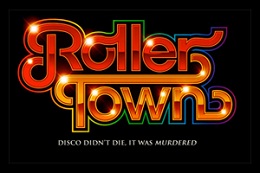 Oh, sweet Jesus, it has come to this. 2012’s Seattle International Film Festival has all but finished, leaving just a few renegade selections out there for random consumption. Much like a person who hits a buffet near the end of the evening, after all the tastiest offerings have been greedily devoured, what a reviewer finds at the end of a festival after all their choice selections have been gulped down is much like that hard, odd-looking piece of salmon holding court in the steam-tray, alone, at 9:55 p.m.
Oh, sweet Jesus, it has come to this. 2012’s Seattle International Film Festival has all but finished, leaving just a few renegade selections out there for random consumption. Much like a person who hits a buffet near the end of the evening, after all the tastiest offerings have been greedily devoured, what a reviewer finds at the end of a festival after all their choice selections have been gulped down is much like that hard, odd-looking piece of salmon holding court in the steam-tray, alone, at 9:55 p.m.
In this way, one could appropriately associate Roller Town with a rotten piece of fish: for both appear to have had promise once, yet emit a foul odor when held up close enough for proper inspection.
Oh yeah, and they’ll both make you want to throw up. Like, a lot.
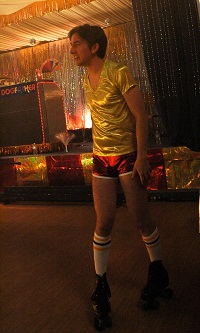 More or less about Leo (Mark Little), and his struggle to save his beloved local roller disco, Roller Town is a mish-mash of campy humor and intense faux-violence that never comes together. Besides first-time director Andrew Bush’s inability to cobble together even one complete scene out of this giggle-inspired tripe, it also doesn’t help that many of the gags are recycled, leaving the audience with a movie that is equal parts poor and plagiarized.
More or less about Leo (Mark Little), and his struggle to save his beloved local roller disco, Roller Town is a mish-mash of campy humor and intense faux-violence that never comes together. Besides first-time director Andrew Bush’s inability to cobble together even one complete scene out of this giggle-inspired tripe, it also doesn’t help that many of the gags are recycled, leaving the audience with a movie that is equal parts poor and plagiarized.
Canadian comedy troupe Picnicface is behind Roller Town, so one would think they’d have more respect for industry predecessors like ‘The Kids in the Hall,’ who wrote the gag about a gang of armed enforcers making a point by killing one of their own. Moments like this, or Leo’s throat chop of Julia (Kayla Lorette) when surprised are indeed funny, yet quickly fade when one realizes it’s already been done on an episode of ‘It’s Always Sunny in Philadelphia.’
And while the actors that populate the movie do a good job coloring in their zany, other-worldly characters, the vignettes they inhabit struggle to stretch a one note joke into a three minute scene, giving Roller Town a forced, almost desperate feeling. In this way, the film feels a lot like some of the more rushed, uninspired S.N.L. films like Superstar, A Night at the Roxbury, or The Ladies Man: features born out of a humorous joke never meant to last more than a handful of minutes.
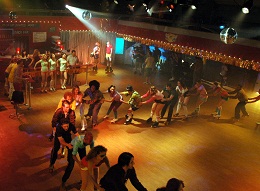 Other reviews are giving Roller Town something of a pass because it is unapologetically camp, and never strives to be anything but a lighthearted trip down a 1970’s nostalgia highway. The rub, though, is that the universe in Roller Town didn’t ever exist. Movies rooted in camp that succeed, like Anchorman or Wet Hot American Summer, thrive because they hearken back to an established point of reference with commonly held notions about that film’s universe (i.e., that 1970s newsmen were greasy idiots, or that 1980s summer camps were drug and sex-fueled rites of passage). These are things most people can look back upon in some way, yet with Roller Town, there’s nothing even remotely connected to reality.
Other reviews are giving Roller Town something of a pass because it is unapologetically camp, and never strives to be anything but a lighthearted trip down a 1970’s nostalgia highway. The rub, though, is that the universe in Roller Town didn’t ever exist. Movies rooted in camp that succeed, like Anchorman or Wet Hot American Summer, thrive because they hearken back to an established point of reference with commonly held notions about that film’s universe (i.e., that 1970s newsmen were greasy idiots, or that 1980s summer camps were drug and sex-fueled rites of passage). These are things most people can look back upon in some way, yet with Roller Town, there’s nothing even remotely connected to reality.
The movie tries to convince the audience that this is alright, that it’s the point, somehow — yet the result is a film that looks like it was a hell of a lot more fun to make than it is to watch. Awkwardly random lines like “you’re the cob of corn where my dick fits” are kind of funny, and were probably a hoot to say on-camera, yet they’re the perfect example of comedic reverse-engineering at its worst. Indeed, ludicrous notions cooked up at a bar after the eighth round of Crown Royal shots usually sound great at the time, yet a joke about corn-fucking isn’t one easily stretched, and Picnicface’s attempts to do so with this and other uneven gags fall flatter than a wet tortilla.
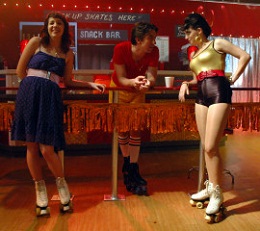 As bad as the movie is during its first act, it miraculously finds a way to get more foul as it continues, for the “plot” concerning Leo and his romance with the corrupt mayor’s daughter amidst a disco revolution is just as silly and pointless as it sounds.
As bad as the movie is during its first act, it miraculously finds a way to get more foul as it continues, for the “plot” concerning Leo and his romance with the corrupt mayor’s daughter amidst a disco revolution is just as silly and pointless as it sounds.
Although director Andrew Bush seems to really want his audience to suspend their disbelief, and submit to the universe he’s created, the world of Roller Town is a stilted, poorly timed comedic nightmare, making it a place few would ever want to visit. The tone of the picture is uneven, the characters aren’t engaging, and the era it glorifies (vein-popping disco fever) isn’t one most people remember with longing fondness.
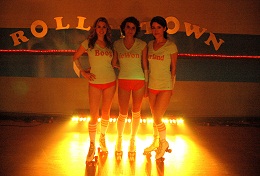 Thus, taken as a whole, Roller Town is a poorly-made, ill-conceived, wretchedly-crafted comedy that achieves most of its laughs via a series of shock-gags that are either ripped-off carbon copies or original clunkers. The musical interludes between scenes wear out their welcome after their second appearance, and the vague connections the movie tries to make between video games and teenage addiction never take root or develop.
Thus, taken as a whole, Roller Town is a poorly-made, ill-conceived, wretchedly-crafted comedy that achieves most of its laughs via a series of shock-gags that are either ripped-off carbon copies or original clunkers. The musical interludes between scenes wear out their welcome after their second appearance, and the vague connections the movie tries to make between video games and teenage addiction never take root or develop.
Not that this is a surprise, for Roller Town doesn’t seem too concerned with making any kind of a point: indeed, how could anything this uninspired and half-assed ever hope to do so?





Comments on this entry are closed.